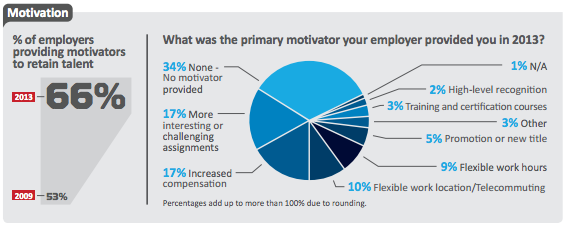Dice just released their 2014 technical salary survey results. You can download the full survey here.
The report provides insights into the current state of tech hiring across the U.S. The infographic below provides details of the top five salaries and markets for technical talent in 2013.

In today’s competitive hiring market, retaining your best technical employees is vital. Rest assured your best technical talent is getting regular calls from recruiters. Will they listen? Are you doing enough to retain them?
The chart below breaks down some of the ways organizations attempted to retain their talent in 2013. They include compensation, increased responsibilities, recognition, and work flexibility.

The full report goes into more details on the current state of technical salaries and expectations. More details below:
Dice’s Salary Survey Report for 2014 shows that salaries and confidence are rising for U.S. tech professionals, but tech powered companies are on edge as compensation satisfaction slips.
More tech professionals in the U.S. enjoyed merit raises last year, driving average salaries up nearly 3% to $87,811. Tech professionals understand they can easily find ways to grow their career in 2014, with two-thirds of respondents (65%) confident in finding a new, better position. That overwhelming confidence matched with declining salary satisfaction (54%, down from 57%) will keep tech-powered companies on edge about their retention strategies.



[rant starting]
Lars, the “AVERAGE SALARY FOR High Paying Skills and Experience” is wholly nonsensical – not even sure what Dice is attempting to do by offering this. It doesn’t even give a logical picture of reality; for instance, when one is entrenched in the Hadoop framework also likely touches MapReduce, Hive, Python, R, etc. and probably some nix variation of C++.
Since Dice won’t return my emails, perhaps they’ll read this: When you “report” on individual skill versus “dev stack environments” you create an unnecessary feeding frenzy when HR, recruiting and tech have no idea why they’re biting each other. You also fail to promote the reality that a darn good developer can learn a new language lickity-split, instead fomenting the notion that “Houston, we have a MAJOR talent shortage.”
There’s plenty of talent – there is, however, a shortage of companies that (a) have the human resources acumen to recognize how the minds of technical people work;and (b) have recruiters who know how to engage and market to technical people. It’s a Perfect Storm of “OMG, we can’t find people!”
Dear Lord, open your eyes…
[rant over]
I’m glad this post gave you an opportunity to air your grievances with Dice. Seems like that’s been brewing awhile.
This is a guide, not an absolute. It’s a reference point, just like all the other reference points recruiters should be exploring. If anyone in a hiring position reads any one piece of data and bases their assessment of the market on that single point, that’s their bad.
I don’t think a survey deserves the blame for HR departments being too cautious to hire for versatility and adaptability. I agree with that point, but think it’s a separate (and bigger) issue.
In case you’re reading these comments and are wondering if Lars and I are pals – the answer is yes.
Lars – surveys (while you’re right, they’re simply one data point) like these DO impact those who don’t search for other convergent points; this IS a problem we have in HR. So while it is one guide, those who don’t immerse themselves in talent communities and thus know what is really going on, tend to lose touch. This is why both of us know first hand why to be successful, recruiting HAS to be a contact sport.
[to infinity and beyond! good luck with S…]
This is confirmed. There’s always room for healthy debate.